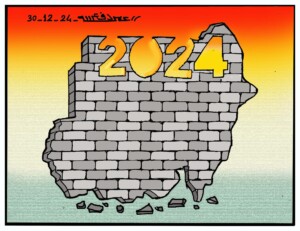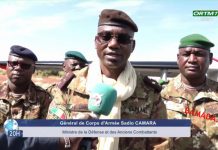Sudan Media Forum*: Joint Editorial Room
Prepared and edited by: Sudan Tribune
With each passing day of war in Sudan, the chances of reaching a peace agreement to end the suffering of the Sudanese people diminish, as the tribal nature of the fighting becomes increasingly complex, moving from a confrontation between two military forces to a full-blown direction that could spread across the country.
Recently, political forces have put forward proposals to form a government parallel to the government of Port Sudan, which many interpreted as the beginning of the actual division of Sudan and the closure of the window of hope for peace with the complicity of the armed forces currently managing the scene.
Before that, all local, regional and international attempts to open the horizons for peace in Sudan failed, with the intransigence of the parties to the conflict in sitting down to the negotiations, despite the efforts made by the various parties to convince them to stop the war.
The right framework for peace
Brigadier General Walid Ezzdine Abdel Majeed, a member of the Central Command for Officers, Non-Commissioned Officers and Retired Soldiers (Tadamon), told Sudan Tribune that in the midst of this catastrophic war, it is necessary to put things in context and use logical thinking to end it and establish sustainable peace.
Ezzedine pointed out that peace operations are important subjects taught in military institutes in Sudan, and that the Sudanese Armed Forces participated in many peacebuilding operations in Kuwait, Congo, Mozambique and also in Lebanon.
Peacebuilding operations were carried out in three phases: peace-making, peacekeeping and peacebuilding, and were carried out in sequence and the contents of each stage and its mechanisms until sustainable peace was achieved.
At the same time, he believes that as the war approaches its second year, the Jeddah platform is most appropriate if it is focused on and responded to by the warring parties, taking into account the stages of achieving peace.
The military expert identified the first phase as peace-making, which aims to stop the fighting through negotiation and convince the parties to agree to lay down arms.
In addition, the second phase comes to the military expert, which is peacekeeping, which focuses on removing the effects of war and begins immediately after the ceasefire and the presence of peacekeeping forces to separate the warring parties, protect civilians, enter organizations, disarmament and establish law.
The third phase, according to the military expert, is to address the immediate causes and roots of violence, injustice, marginalization and inequality, and is considered a consolidation of peace and institution-building led by civil society.
Stripping of bond and support
In the face of the devastating war raging in Sudan, the positions of the political forces fluctuate, as they appear to be clearly divided between the warring parties, while some prefer to remain neutral without showing real steps that contribute to stopping it.
Wajdi Saleh, a leader of the Arab Socialist Baath Party, told Sudan Tribune that peace is now directly linked to the existence and cohesion of the state, after it was a step on the way to achieving regional satisfaction and stability.
Wagdy considered that this carries and places a great responsibility on the shoulders of national forces, to confront it as an existential challenge to the Sudanese state after nearly seven decades of independence.
He stressed that peace in Sudan has always been one of the most prominent headlines of the national crisis, since political independence in the middle of the last century, and the emergence of regional social and economic development imbalances, which manifested themselves in the emergence of regional blocs and armed rebellions against the central authority.
Wagdy pointed out that two years after the April 15 war, the scene has become more complicated after the war spread throughout the country, the collapse of the central authority and the resulting weakness of security and military institutions, the politicization of its decisions in favour of the remnants of the former regime, and the emergence of multiple new armed groups based on polarizing both sides of the war, and promoting hate speech and war, which have become a threat to Sudan’s political and social unity, security and stability.
Wajdi explained that the two parties to the war and their supporters bear the burdens of this war and its consequences, and this requires pressuring them and stripping them of any popular incubator and any future political role.
Sudanese insomnia and researchers
Sudan’s tragedy seems lost with the absence of any national project since independence, as wars, disputes, intersections and interests over the country’s future crystallized during the military’s rule of the country through coups for many years.
A member of the Executive Office of the Sudanese Teachers’ Committee, Ms. Doria Mohammed Babiker, told Sudan Tribune that the issue of searching for prospects for peace in Sudan has become one of the important and urgent issues that worry all those looking for solutions to the Sudanese crisis.
At the same time, she stresses that it is not possible to search for prospects for solutions without returning to the roots of the protracted crisis with which all solutions have failed, which were like painkillers, and once their impact subsides, the symptoms and effects return more severe than before.
Doria believes that the solutions lie in the search for the roots of conflicts, which is the first step towards a solution, noting that the absence of a national project that meets the desires and aspirations of all Sudanese, and the issues of political, economic, social and cultural marginalization, and poor development in many fields, led to the outbreak of wars and the continuation of the struggle for power and wealth.
At the same time, she pointed out that in the search for prospects for sustainable peace in Sudan, all these causes must be taken into account and addressed through the establishment of sound political governance that takes into account tribal, ethnic and geographical diversity and is established through its institutions to provide sustainable development that provides basic social services including health, education and infrastructure, and ensures the participation of all in decision-making, equitable representation at all levels of governance and justice through the promotion of the rule of law and the redress of historical grievances.
With the end of another year of war between the Sudanese army and allied forces, and the Rapid Support Forces (RSF) with the support of several militias, Sudan’s devastating war, which could reach its third year, continues amid distant hopes of a cessation of hostilities for the time being.
International pressure
Shihab Ibrahim, a leader of the Coordination of Civil Democratic Forces (Taqaddum), told Sudan Tribune that one of the most important reasons why there may be chances for peace and a comprehensive settlement is the increase in international pressure on the parties to the conflict to sit at the negotiating table and reach a peaceful solution.
He also believed that continued human suffering would increase popular pressure on the parties to the conflict to end the war.
The change in the military balance on the ground, according to Shehab, may also push the parties to the conflict to negotiate, which will open up new economic opportunities for Sudan if peace is achieved, encouraging the parties to reach a peaceful solution.
He stressed that there are many interrelated factors that affect the course of events, and the data may change quickly, which depends on many factors, including the seriousness of the parties involved in the war, the nature of the support received by each of the parties, and regional and international developments.
Jump in the dark
Anas Adam, a member of the National Liberation Council of the Sudan People’s Liberation Movement-North, told Sudan Tribune that the issue of turning the page on wars requires courage to address and address the roots of the Sudanese problem, such as the issue of the relationship between religion and the state, the identity crisis, Islamophobia, Arab holding, forced unity and other fateful issues.
Anas believes that the Sudanese elites, whether ruling or opposed, have always evaded those fundamental issues that generated grinding and racist wars against marginalized Sudanese peoples.
He adds that this is embodied in the aerial bombardment of citizens in Darfur, the Nuba Mountains and in Yabous in New Funj Blue Nile, as it happened recently on December 19, 2024.
He asserts that talking about addressing the country’s deepening crises and ending wars in the absence of political will and desire of political forces is nothing more than a leap into the dark, stressing that this is what the movement sensed during the Juba negotiations between the Sudan People’s Liberation Movement-North and the post-December revolution government and in many consultative platforms with political forces, the latest of which was the Addis consultations last August, which were called for by the African Union.
Anas pointed out that the forces participating in the Addis consultations overlooked the historical roots of the Sudanese problem and reduced the wars to the April 15, 2023 war, which they consider a manifestation and extension of wars since 1955.
He stated that what he called the “Islamist Port Sudan cartels” also insist on the distorted religious state as a Trojan horse to smuggle the ethnic and religious agenda, despite the fact that the Sudanese state is full of ethnic and religious pluralism and diversity, and Sudan is almost the only country where dual racism is practiced “racism on the basis of race and religion.”
He stressed that the issue of democratic transition cannot be addressed without dismantling and destroying the state of divine mandate and putting a logical end
to the wars, considering that otherwise Sudan remains threatened with fragmentation again and the independence of South Sudan will not be the end.
This report is published simultaneously on the platforms of media and press institutions and organizations that are members of the Sudanese Media Forum

This report was prepared in partnership with the Sudanese Media Forum’s member organisations.
#SilenceKills #الصمت_يقتل #NoTimeToWasteForSudan #الوضع_في_السودان_لا_يحتمل_التأجيل #StandWithSudan #ساندوا_السودان #SudanMediaForum
*The Sudan Media Forum is a coalition of independent media outlets and organisations including:
– Dabanga – Radio / TV / Online
– Sudanese Journalists Syndicate
– Sudan Tribune
– Al-Tayar newspaper
– Aljreeda Newspaper
– Sudan-Bukra Media Org
– Altaghyeer newspaper
– Ayin Network
– Alrakoba.net
– Sudanile.com
– Journalists for Human Rights – JHR – Sudan
– Female Journalists Network-Sudan
– The Democrat Newspaper
– Hala Radio – 96 FM
– Radio (PRO FM) 106.6
– Medameek newspaper
– Darfur 24
– Al-Ayam Center for Cultural Studies and Development
– Teeba Press
– Alalg Center for Press Service
– Sudanese Center for Research, Training, and Development Services
– Article Center for Training and Media Production
– mashaweer-news.com
– Sudans Reporters
– Televzyon Platform
The post Prospects for peace in Sudan: A closed window in the absence of will and hope appeared first on Dabanga Radio TV Online.
Source: dabangasudan










